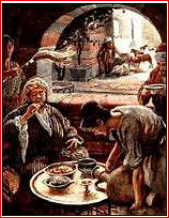Almost 40 years ago, Rabbi Harold Kushner published a book with a captivating title: “When Bad Things Happen to Good People?” Everyone can relate to that question that has become part of common parlance. Rabbi Kushner wrote his reflection, almost as a meditation, after his young son was diagnosed with a fatal disease. Like millions of others, I read his book and it contains a wisdom and a compassion that has been a source of solace for many over these years. The question is, in fact, haunting and one that as a parish priest I have heard all too many times. Doubtless, you, too, have posed the question in one way or another.
It seems to me that one of the first responses many of us has when something bad happens is, “What did I do to deserve this?” Somehow, we want to connect our behavior with what happens to us; and often that is the case, but not always. In fact, the very nature of the question rather implies that bad things should happen to bad people and good things to good people. When we cannot find the “bad” we have done that seems to merit the suffering, many feel a sense of unfairness and anger toward someone, often God. Of course, we always want someone to blame for our suffering.
Yet, each of us knows that life is not fair and suffering is a part of life. Your mother suffered to give you birth; your father suffered to care for you and both parents suffered to raise you. The beginning of suffering is in the very nature of our broken human condition. A Christian traces this brokenness to The Garden and original sin. That original sin was placing human interest and will over God’s and ever since, we struggle with the consequences of that choice.
As I consider my own journey, now in its 74th year, it seems to me that we spend our entire life learning to let go. This begins when we have to let go of the safety and comfort of our mother’s womb and the “letting go” of our self-interest and selfishness continues from infancy into childhood through adulthood and finally arriving at our senior years. All along the way, we have to learn to “let go” and that is hard and often painful. The process means we live into the truth of our mortality; life is oh so brief and our destiny is not to be found here on earth.
For me this “letting go” about which I speak frees me to find and embrace what gives my life meaning and direction – a relationship with God. There is nothing more meaningful, more fulfilling and more capable to make whole my broken human condition. For this relationship brings me to Christ, the source of all that is Love. Living in a relationship with Christ leads me to others offering the hope and joy, the suffering and sorrow we know together. In the gift of these relationships of family, friendship and community, we find the authentic experience of love, learning to let go and to embrace – almost in practice for our final letting go and embrace.
Fr. Ronan

Twenty-sixth Sunday – Ordinary Time September 28/29, 2019
In today’s Gospel Jesus offers a warning about living selfishly in his parable of the Rich Man and Lazarus. The Rich Man holds sumptuous feasts and dresses in fine clothes. But despite his affluence he does nothing to relieve the painful hunger and debilitating condition of his neighbor Lazarus.
He neglects to love his neighbor as he loves himself and is sent to hell for his lifestyle and desire for self-gratification.
The Rich Man represents those who spend their money on their own personal pleasures with no regard for sharing their material possessions with the poor and needy in their own neighborhood.
Good stewards realize the practical implications of not only loving God, but loving their neighbor as they would love themselves.
Who are the less fortunate in our neighborhood?
Do we share a portion of our own blessings with them?
